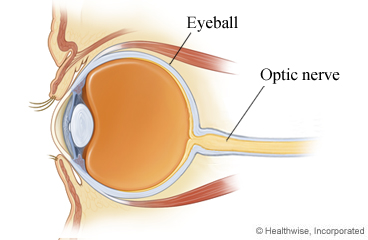
Overview
Dry eyes can be uncomfortable. The dryness may make your eyes feel dry or hot. Your eyes may also water a lot. In some cases, dry eyes make it feel like there is sand or dirt in your eyes.
From time to time, dry eyes may cause you to have blurry vision. But dry eyes don't usually cause lasting problems with vision.
There are many causes of dry eyes. Sometimes dry weather, smoke, or pollution can bother the eyes. Other times, allergies or contact lenses irritate the eyes. Older people often have dry eyes because our eyes do not make as many tears as we age. In some cases, diseases can cause dry eyes. These include rheumatoid arthritis, lupus, and Sjögren's syndrome. In other cases, medicines are to blame. Your doctor may want to do tests to help find the cause of your dry eyes.
You can work with your doctor to find ways to help your eyes feel better. Home treatment often helps.
Follow-up care is a key part of your treatment and safety. Be sure to make and go to all appointments, and call your doctor if you are having problems. It's also a good idea to know your test results and keep a list of the medicines you take.
How can you care for yourself at home?
- Take breaks often when you read, watch TV, or use a computer. Close your eyes. Do not rub your eyes. Artificial tears may help you when you do these activities. You can buy these without a prescription.
- Avoid smoke and other things that irritate the eyes.
- Wear sunglasses that wrap around the sides of the head. These can protect the eyes from sun, wind, dust, and dirt.
- Use a vaporizer or humidifier to add moisture to your bedroom. Follow the directions for cleaning the machine.
- Do not use fans while you sleep.
- If you usually wear contact lenses, use rewetting drops or wear your glasses until your eyes feel better.
- Be safe with medicines. Take your medicine exactly as prescribed. Call your doctor if you think you are having a problem with your medicine.
- Try using artificial tears at least 4 times a day.
- If you need drops more than 4 times a day, use artificial tears without preservatives. They may irritate the eyes less.
- Use a lubricating eye ointment or eye gel at bedtime. These are thicker and last longer, so you may have less burning, dryness, and itching when you wake up. Be aware that they may blur your vision for a short time.
- To put in eyedrops or ointment:
- Tilt your head back, and pull the lower eyelid down with one finger.
- Drop or squirt the medicine inside the lower lid.
- Close your eye for 30 to 60 seconds to let the drops or ointment move around.
- Do not touch the ointment or dropper tip to your eyelashes or any other surface.
- Put a warm, moist cloth on your eyelids every morning for about 5 minutes. Then massage your eyelids lightly. This helps increase the natural wetness of your eyes.
When should you call for help?
Watch closely for changes in your health, and be sure to contact your doctor if:
- Your eyes are still dry, irritated, or teary, and artificial tears do not help.
- Your vision changes.
- You do not get better as expected.
Where can you learn more?
Go to http://www.healthwise.net/patientEd
Enter D231 in the search box to learn more about "Dry Eyes: Care Instructions".
Current as of: October 1, 2025
Author: Ignite Healthwise, LLC Staff
Clinical Review Board
All Ignite Healthwise, LLC education is reviewed by a team that includes physicians, nurses, advanced practitioners, registered dieticians, and other healthcare professionals.

